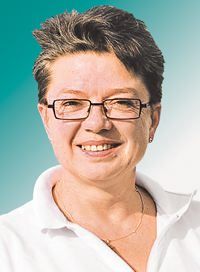The journalist Brigitte Schulze has been highlighting Ukrainian events for almost 20 years in the German press, including the newspaper Frankfurter Allgemeine Zeitung. She has a good opportunity to have an inside look at the ongoing changes. It would seem quite logical for her to write books on the difficult birth of Ukrainian democracy, the sprouts of a civil society, political battles, or social realities. But Brigitte made a sharp turn towards an altogether different — more realistic and not at all newsworthy — Ukraine.
This side of the country, which, incidentally, Den/The Day has devoted itself to, is unknown even to Ukrainians themselves, let alone people in the West for whom the set of associations that the word “Ukraine” calls up ends as soon as on the fifth word. This word is corruption. At least this is an opinion of Brigitte who used to visit Ukraine with suitcases full of tableware 20 years ago, when she tasted the “delights of Soviet comfort.” It is strange and even stunning that Brigitte did not flee but, on the contrary, took a strong liking to this country in the long run. She showed true and self-denying love for a country in the grip of a dragged-out transition period. And these are not just highfalutin words: it is an almost exact quotation of the title of Schulze’s book Ukraine: How Much I Love Her. Travel with Me. The journalist published this German-language guidebook at her own expense in Germany. Brigitte is also planning to publish an English-language version in the near future if the book begins to fly off bookstore shelves.
In addition to sentimentalism, this book has something much more important from the pragmatic angle. Brigitte and other enthusiasts like her often perform the function of Ukraine s cultural representatives abroad, the shortage of which remains one of the major lacunas in Ukrainian development. But for these enthusiasts, Europe, which is not exactly overfilled with the knowledge of Ukraine, would be still convinced that Ukraine is part of Russia or that wild animals prowl the streets of Kyiv. To tell the truth, it is not Brigitte s job to promote Ukraine in Europe, so she deserves at least a "thank you". The same applies to all the others who are telling the world about Ukraine, putting this name next to the word "love". And it seems to me that those who badly need publications similar to the one that Schulze prepared are not only Europeans on the eve of Euro 2012 but, above all, Ukrainians themselves even though we do not understand even a word in the German-language text, except, naturally, for "Ukraine and Liebe".
The first thing that draws attention in this publication is its very touching and eloquent title: Ukraine: How Much I Love Her. Travel with Me. What is the source for this sentimentality towards Ukraine, especially taking into account the alleged German pragmatism?
"Above all, it comes from the people I happened to meet and mingle with here. I came to Ukraine 20 years ago. I was ignorant of and badly-versed in political matters. But I was in rapture over the people I met. I am still friends with some of them.
Let me open a secret: I once fell in love with a Ukrainian, and we were even going to get married. And although there was no result, I still carry this love in me. Maybe, it also influenced the choice of my book s title. I love this man and his family, and, at the same time, this land and all the people who live here.
I consider people the most important feature of a country. It is perhaps owing to these special people, who are close to my heart, that I look at Ukrainian reality more condescendingly than other foreigners. I often hear complaints from tourists: they don t like this; they don t accept that I also dislike many things and come across difficult situations in this country, but there is some sentimentality in my heart, which ties me up to Ukraine."
You have been watching Ukraine from inside for almost 20 years. Last year the world public marked the 20th anniversary of the fall of the Berlin Wall. That was a crucial event for entire Eastern Europe. What transformations have Ukraine and our society the people you are talking about undergone in these 20 years?
"This is difficult to express in a few sentences. Things are changing very slowly. The country and the people have been changing with every passing day and week, step by step. These changes are already easy to see on the streets and in stores. For example, when I was first coming to Ukraine 20 years ago, I was carrying tableware in suitcases, because it was practically impossible to buy some here.
People have also changed including journalists. Many of them are young but quite experienced."
Do you think the "wall" between Ukraine and Europe has been torn down?
"I think so. But the trouble is that Ukraine is not very well-known in the world. Even today, many view it as part of Russia."
What are your impressions of the recent presidential elections?
"Frankly, I am fed up with politics. This is why I decided to write about a different Ukraine. This country s government does not even imagine how much it tarnishes the image of Ukraine in the world. I agree to the paradoxical statement that Ukrainian society is better developed than those who lead it."
Speaking of your book again, what prompted you to write it?
"There are various reasons. First of all, a desire to fill an empty niche in the informational space. As for Germans, they know almost nothing about Ukraine except for the Klitschko brothers, Dynamo Kyiv, and Chornobyl. They know that there is a mess in the government and everything is steeped in corruption. They know this because journalists write about it. But almost nobody ever mentions the country I speak about in this book. There are guidebooks on Ukraine in Germany, but they have black-and-white photos and texts written back in the Soviet era. They say, for example, that there are no filling stations on Ukrainian roads.
Ukraine is potentially interesting for Germans. Many of them are tired of traveling to Italy, Britain, or France. They do not know Eastern Europe, and it attracts them for this reason. I have written the book to encourage Europeans to travel to Ukraine. This is a practical guidebook: it tells you about the best way to reach Ukraine, useful contacts, and such things as hotels, taxis, food, etc. I have gone through all this and now I am telling others about my experience.
Actually, this is my second book devoted to Ukraine. The first one was on Odesa. I think it is a successful publication. The book sold well in both Ukraine and Germany. If the second book also sells well, I will be able to make this kind of publications further on. I am planning to publish a Lviv guidebook by the end of 2010. As Euro 2012 is coming up, Europeans do need such books.
Besides, this book is being published also for charitable purposes. I intend to remit a part of its sale proceeds to the account of a charitable foundation that supports Ukrainian artists and musicians. I am a musician myself, so I know their plight very well. Ukrainian musicians must have a chance to perform both in Ukraine and abroad."
By what principle did you choose the 10 itineraries that you recommend to readers?
"Through my own experience of traveling across Ukraine. Having seen so much, I decided I must tell about Kyiv, Lviv, Odesa, the Crimea, and, naturally, the eastern cities. I also mention the ski resort Bukovel, because nobody in Europe knows that one can have a very good winter vacation in Ukraine and that there are new Austrian-made ski lifts and good hotels there. I also wrote about Kamia nets-Podilsky, as well as about the places which one should avoid, such as, for example, Transnistria."








